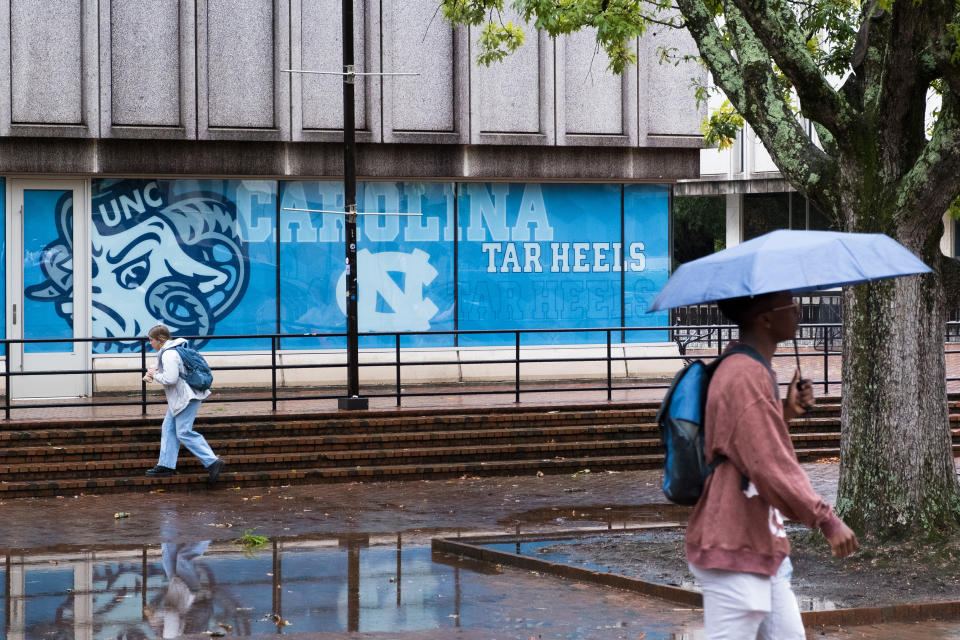Next front in the attack on affirmative action: State diversity programs
Tyler Lynn, a Spanish instructor in Eagle Point, Ore., says he’s out $192 because a state rebate to renew teaching licenses is not available to him, a White man whose native tongue is English. So he’s suing to open the program to all.
While some teachers get the rebate “by just being of the correct race,” Lynn said in an interview, “I don’t get a dime from the state for my skills or my qualifications.”
Lynn is one of a half-dozen plaintiffs who have launched challenges in recent months against state programs meant to increase racial and ethnic diversity across a range of professions, from teaching to farming to podiatry. Their lawsuits represent the latest front in a conservative campaign to roll back affirmative action programs in government and diversity, equity and inclusion (DEI) initiatives in the corporate world since the U.S. Supreme Court overturned race-conscious college admissions last year.
Such programs are ripe targets, legal experts say, in part because nearly every state and locality has one or more that benefit women, minorities and other underrepresented groups. They typically offer financial benefits like Oregon’s teachers rebate, or greater opportunity to pull the levers of power on government boards and commissions. But now their legal justification - that government has a “compelling interest” to remedy past or ongoing discrimination - is undergoing a radical reexamination in American society.
On Tuesday, a federal judge in Texas ordered a federal agency created to help minority-owned businesses access capital and government contracts to open its doors to everyone, including White business owners. U.S. District Judge Mark T. Pittman, a Trump appointee, ruled that the government’s reliance on broad racial categories to assist such businesses was unconstitutional.
If courts extend that logic to similarly styled state programs, it could force a fundamental shift in “legislatures to reevaluate how they achieve this type of diversity,” said Marcus A.R. Childress, an attorney with Jenner & Block and a member of the firm’s DEI Protection Task Force.
So far this year, lawsuits filed by White plaintiffs have challenged a Minnesota grant program for women and minority farmers, seats set aside for minorities on a Louisiana medical board and an Alabama real estate board, and the Oregon teachers rebate, which is available to Blacks, Hispanics, Asians, Native Americans or teachers whose native language is not English.
“We are firing on all cylinders now,” said Joshua P. Thompson, director of equality and opportunity litigation at the Pacific Legal Foundation, a conservative public interest law firm representing many of the plaintiffs, including Lynn.
In a federal lawsuit filed in February, Lynn seeks to end the Oregon program’s preference for minority applicants, alleging that it violates his 14th Amendment right to receive equal treatment under the law.
Lynn said he’s not necessarily opposed to efforts to foster a diverse environment, noting that around 30 percent of the students in his school district are Latino.
“But I do think that they’re going about it the wrong way,” he said. “These things have to be done legally and ethically.”
Lynn acknowledged that $192 is not a lot of money to put up a fight over. But that misses the larger point, he said, which is that he works as hard as anyone else to create a welcoming environment for newly arrived students from Latin America, regardless of his native language or the color of his skin.
The rebate program was created in 2019 to increase diversity among K-12 teachers in the state. A 2022 state report on educator diversity found that Hispanic students outnumber Hispanic teachers nearly 3 to 1, while the percentage of White teachers far exceeds the portion of White students.
“It seems that the Oregon legislature really cares about racial diversity in the classroom from teachers,” said Childress, of Jenner & Block. “And if this were to be struck down, then it would force states to have to reevaluate how they achieve the goals that they have - for example, getting more diverse teachers in the classrooms.”
The Oregon attorney general’s office, which is defending the rebate program, did not respond to a request for comment.
Though the Supreme Court ruling against Harvard University and the University of North Carolina at Chapel Hill concerned college admissions, it sparked a wave of legal action challenging DEI efforts in the private and public sectors. In addition to the lawsuits targeting state programs, conservative legal groups have challenged a number of federal programs.
The Small Business Administration’s 8(a) program for minority government contractors overhauled its application process last year after a court ruled that the SBA could not automatically assume that Black, Hispanic, Asian or Native American business owners qualify as socially disadvantaged - a key requirement. This week, the Minority Business Development Agency was similarly blocked from using racial categories to determine applicant eligibility. Other cases, including one against a Transportation Department program that set aside $37 billion in contracts for minority businesses, may take years to decide.
However, the vast majority of race-based government programs are operated by states and cities, said Thompson, with the Pacific Legal Foundation. Fifteen states have race- and sex-based mandates that apply to most public boards, according to a survey released in October by his foundation. In 14 states, the survey found similar requirements for 63 professional licensing boards responsible for social work, dentistry, pharmacy and medical examination. All told, at least 25 states have such requirements in some form, according to the report.
Thompson said he believes there are far more.
“We haven’t scratched the surface,” he said.
In the past, courts typically have upheld government affirmative action programs on the grounds that society has an interest in remedying past and ongoing discrimination, said Joy Milligan, a former lawyer with the NAACP Legal Defense Fund who now teaches at the University of Virginia.
Now, she said, “formal law really hasn’t changed in any binding way,” but “lower courts are becoming much more aggressive at chipping away at those precedents … in response to a much greater volume of challenges from conservative legal organizations.”
Several consequential cases have followed that trend, Milligan said. A successful 2021 lawsuit challenged an SBA grant program for restaurants hurt by pandemic lockdowns that gave priority status to establishments owned by women, veterans and minorities. And a judge halted a $4 billion debt relief program for Black farmers in June 2021.
While the Harvard-UNC decision has little direct bearing on race-conscious government programs, Milligan said, the ruling signaled “a mood and a reality” that the conservative legal movement has become extraordinarily robust.
“They’re just thick on the ground,” Milligan said. “Colorblindness and attacking affirmative action has been a premise of the conservative movement since the ’70s, but it’s just everything is falling into place for them.”
Multiple fronts
Lance Nistler, a White farmer in Minnesota, sued the state in January over its program for farmland down-payment assistance. He claimed his application was denied because he isn’t a woman or a minority - in violation of his 14th Amendment rights - and is seeking to end the program’s use of such preferences.
Started in 2023, the program awards $15,000 grants to farmers earning less than $250,000 annually. But because too few grants went to underrepresented groups, the program now gives preference to “emerging farmers,” defined as women, veterans, people with disabilities, American Indians, members of a community of color, farmers 35 and younger, as well as farmers from other groups, according to a recent state report.
Nistler contends those distinctions are neither fair nor legal. He said he’s bringing the lawsuit to “give all Minnesotans a fair chance at a difference-making grant program.” Thompson, whose foundation is representing Nistler, described the case as one among many that could change laws allowing race-based programs.
The goal is to “stack wins and wins and wins” until at least one of those cases lands before the Supreme Court, which is dominated by a conservative supermajority, Thompson said.
That was the “strategy of the NAACP in getting [Brown v. Board of Education] to the Supreme Court,” he said, referring to the landmark 1954 ruling that forced the integration of American public schools. “It’s a public interest litigation strategy that I think we follow as well.”
The Pacific Legal Foundation is just one of several public interest law firms and think tanks seeking to undermine programs based on racial preferences. While the foundation focuses largely on state programs, the conservative Wisconsin Institute for Law & Liberty has multiple pending lawsuits against long-running federal programs. Meanwhile, the National Center for Public Policy Research and America First Legal, a nonprofit led by former Trump White House adviser Stephen Miller, have taken the fight to corporate boardrooms and the U.S. Securities and Exchange Commission.
Edward Blum, the driving force behind the college admissions case, is leading a highly watched challenge to an Atlanta-based venture capital firm for Black women. And just last month, Blum’s American Alliance for Equal Rights sued the Smithsonian National Museum of the American Latino, alleging that its internship program is carrying out “pro-Latino discrimination.”
Blum has now joined forces with the Pacific Legal Foundation to challenge the requirement that the Alabama governor must appoint at least two minorities to the state’s Real Estate Appraisers Board. In a statement to The Washington Post, Blum suggested that the case may represent an important new front in the war against affirmative action.
“An individual’s race or ethnicity should never be a factor to serve on a public board,” Blum said, adding that his alliance “will participate in challenges to public board race quotas in other states if necessary.”
Related Content
The true, dramatic story of Robert Downey Jr.’s ‘Oppenheimer’ villain
This agency is tasked with keeping AI safe. Its offices are crumbling.
U.S. floods arms into Israel despite mounting alarm over war’s conduct


